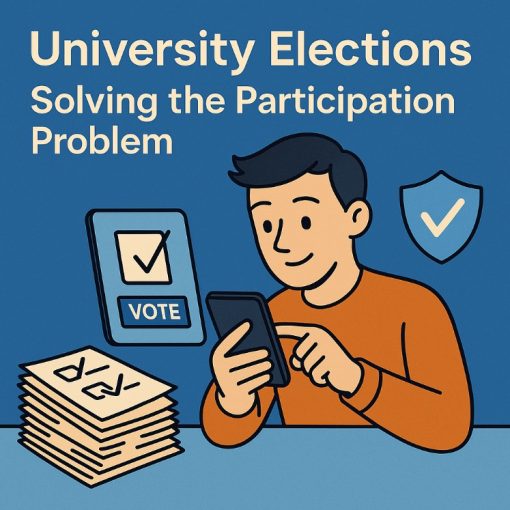University elections are the heartbeat of student governance. They’re where ideas clash, campaigns ignite, and leaders emerge. But let’s be honest: traditional paper-based voting often turns this exciting process into a logistical nightmare. Picture this: endless lines at ballot booths, misplaced votes, and the inevitable accusations of “Did they count my ballot?” By the time results trickle in days later, enthusiasm has fizzled.
Enter OnlineVotingApp.com — not just a tool, but a movement to reclaim the spirit of campus democracy. Here’s how we’re redefining what it means to vote.
The Chaos of Traditional Student Elections (And How We Fix It)
Remember the last student council election? Nomination forms lost in campus mail, voters skipping polls due to exam clashes, and the awkward scramble to verify handwritten voter IDs. These aren’t minor hiccups — they’re barriers to participation.
With our platform, everything from nominations to result announcements happens in one secure space. Candidates submit profiles online, complete with vision statements and campaign videos. Voters access ballots in seconds, whether they’re in a dorm room or a coffee shop. No more chasing down paper forms or worrying about illegible signatures.
And here’s the kicker: our 1-Voter 1-Machine feature ensures each student’s vote is tied to their registered device. No duplicate votes, no mysterious “extra ballots,” just a transparent system that even the most skeptical engineering major would approve of.
Security Meets Simplicity: Why Students (and Admins) Love It
Let’s talk about trust. When the journalism society president accused last year’s election of being “rigged,” it wasn’t just drama — it exposed real flaws in manual processes. OnlineVotingApp.com eliminates guesswork with military-grade encryption and 2-factor authentication (think password + instant OTP). Votes are anonymized instantly and stored across multiple servers, so even the platform admins can’t peek at results early.
But security doesn’t mean complexity. Our interface is so intuitive that first-year students and tenured professors alike can cast votes in under 30 seconds. We’ve even had student governments use the platform to run mock elections for class reps — because when something’s this easy, people want to participate.
A Voting Experience That Actually Respects Students’ Time
Between lectures, internships, and that 2 a.m. pizza run, students don’t have hours to spare. Traditional elections demand they show up at specific booths during narrow windows. OnlineVotingApp.com flips this by keeping polls open securely for 72 hours.
Imagine a commuter student voting between train rides, or a late-night thinker submitting their ballot after a study session. Accessibility isn’t just about convenience — it’s about inclusion. And with real-time voter turnout dashboards, candidates can focus on rallying peers instead of wondering if anyone’s paying attention.
Behind the Scenes: Support That Doesn’t Leave You Hanging
We get it — new tech can feel daunting. That’s why every university gets a dedicated support team (humans, not chatbots!) available by email or phone. Plus, our step-by-step PDF guides — packed with screenshots — make setup feel like following a recipe.
When the University of Central Lakes used us for their referendum last fall, their IT team expected chaos. Instead, they had results certified in 2 hours. “It was like having an election expert on speed dial,” said their elections coordinator.
The Future of Campus Democracy Starts Here
Online voting isn’t about replacing tradition; it’s about preserving what matters — fairness, engagement, and trust. With OnlineVotingApp.com, universities aren’t just upgrading their tools; they’re sending a message: Every student’s voice deserves to be heard, without hurdles or hesitation.
So next time someone says, “But we’ve always done it this way,” remind them: Democracy evolves. And it’s time for campus elections to catch up.
Ready to transform your student elections? Explore how OnlineVotingApp.com brings speed, security, and sanity to your next campus vote. No PhD in IT required.


